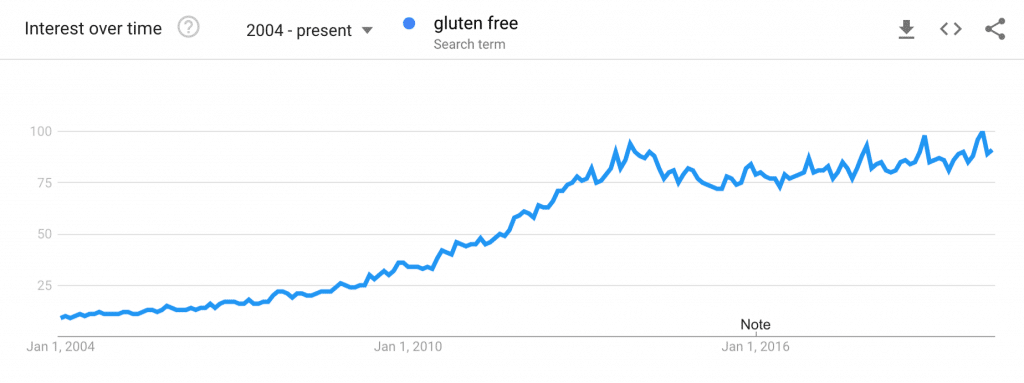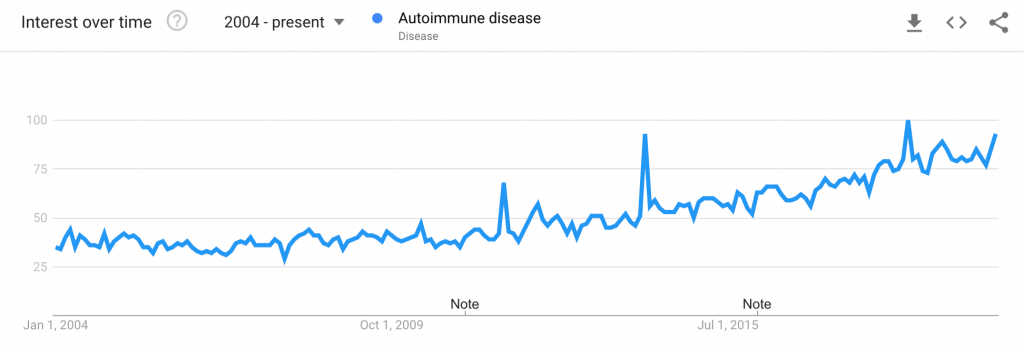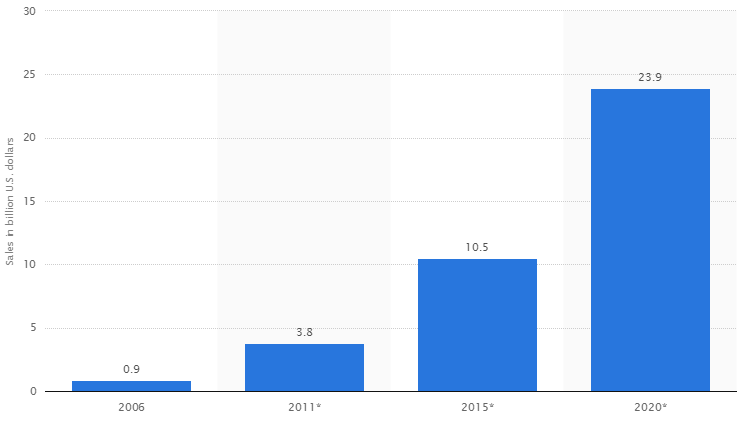There is nothing more frustrating than reading articles and people’s opinions about eating gluten-free and that it is just a fad that will die out. I’m specifically referring to an article on Time.com “Eat More Gluten: The Diet Fad Must Die“
The author, Jeffrey Kluger states:
Food fads are nothing new, and they do run their course. Eventually, the gluten-free cookbooks will wind up in the same river of pop detritus as the no-carb wines and the fat-free cookies and the crock pots and fondue sets and woks everyone in America seemed to buy at once in 1988 and stopped using sometime around 1989. When that happens, the people with celiac or gluten ataxia or genuine gluten sensitivity will still have to wrestle with their illnesses, while everyone else returns happily to their baguettes—searching for the next big thing to exorcise.
And then there is this.
The anti-gluties will surely tell you they feel better, fitter, more energetic, that their withdrawn child has suddenly blossomed and that their man—following the Guide For Guys—is healthier and happier. But the placebo effect—even the placebo effect by proxy, seeming to see better health in someone else—is a very real thing. Most of the time, however, it has nothing to do with the perceived cause.

Unfortunately, in my opinion, he is dead wrong and didn’t do enough research. Living with Ulcerative Colitis, I have a little different perspective on the matter. I live in a world of people with Crohns, Ulcerative Colitis, and Celiac Disease. These are the three main groups that probably struggle with gluten the most.
I am a member of many active FB groups and have seen first hand that in about 95% of the cases going gluten-free has helped improve symptoms or like my case, almost completely got rid of any symptoms altogether.
In my case going gluten-free resolved my stomach issues, it cleared up all my dry skin issues which I have dealt with since childhood, and it got rid of my fatigue. And no it isn’t a placebo.
Research shows gluten intolerance is real—and “science journalists” are clueless.Click to PostSrc: When Gluten-Free Is Not a Fad
Growth Rate in Gluten Related Diseases
Here are some facts about the growth rate in these diseases that Kluger conveniently forgot to mention.
“Approximately 1.6 million Americans currently have IBD, a growth of about 200,000 since the last time CCFA reported this figure (in 2011).”
Src: CCFA (these stats were updated on November 2014). That means between 2011 and 2014 there was an increase of 14% in cases reported.
An estimated 1 in 133 Americans, or about 1% of the population, has celiac disease.
Src: Celiac Central If you do the math on 1 in 133 it comes out to around 3.2 million Americans that suffer from celiac disease.
As many as 70,000 new cases of IBD are diagnosed in the United States each year.
Src: CCFA
If you take a look at Google Trends, you will see the interest over time is still growing when it comes to the “gluten-free” topic.

And if you look at the United States since 2004, interest around autoimmune diseases is also steadily growing.

Just the other day I went out to get my haircut. I sat down and the girl started to cut my hair and chat with her friend who was also cutting hair. They began talking about having stomach issues. Long story short, the person cutting my hair had Celiac Disease, and the person cutting hair next to me has IBD. 100% of the people I interacted with that day had some type of stomach problem.
Here’s another interaction I had recently. I was in Sprouts and saw a man staring at the products in an aisle. He seemed lost. I asked him “Trying to find the good stuff?” He responded with “My 11-year-old son just got diagnosed with Celiac Disease and I have no idea what I am doing.” That almost broke my heart. I could hear the confusion in his voice and so I proceeded to help him pick out some products that were healthy and tasted good.
It boggles my mind how prevalent this is becoming, and it is very scary!
Gluten-Free Sales Growth
U.S. retail sales of gluten-free and free-from foods are projected to grow to 23.9 billion U.S. dollars by 2020. Just since 2006, sales of gluten-free foods have grown 1066%.
Src: Statista

As you can see the gluten-free fad as some call it isn’t going anywhere anytime soon. And being one of those people that has to eat gluten-free I appreciate all the people jumping on the bandwagon even if they don’t have to. Why? Because it means more and more companies will invest their money into researching how to develop gluten-free alternatives.
I still don’t think companies fully realize that all it takes is one family member that has an intolerance or Celiac, and in most cases, they will lose that entire family’s business forever. Whether it be a product in the grocery store or a fast-food chain that isn’t adapting to the times.
I do agree with Jeffrey that a lot of gluten-free alternatives are not any healthier than the real ones. You do need to be very careful. Try to get products with as little ingredients as possible. Try to eat all organic whenever possible.
The gluten-free fad will live on, and we need it too!
Do you have an opinion on the gluten-free fad idea being tossed around? If so I would love to hear your comments below.

There is no point in worrying about, or paying attention to, or discoursing with…. writers.
We need to work with the cereal farmers and their institutions and organizations.
Lots of foods re a threat to human health when eaten insufficiently processed. Wheat (and its gluten-bearing cousins) is one of those. Lets work ==with== the cereal folks to get where we’d prefer to be!
Hey Karl, thanks your comment! Sometimes I get a little frustrated with the fad term :)
I totally agree. I think people in general want to eat healthier. At least more than they used to. Even my parents who don’t have any digestive issues have started cutting out bad foods. Partially because of all the research I have passed onto them about what is truly in all the processed food. It is scary. We definitely need to work with organizations to get where we all want to be!
That writer was talking about people who are otherwise healthy, but use gluten-free to lose weight. They are out there. Don’t you think that’s stupid? But they will go back to it – wheat – someday, is what is meant by “fad”. And they’ll be just fine. You can’t tell me you don’t see what he’s saying.
This has nothing to do with gluten, but the things the public will believe — I just watched The Fifth Estate about the guy who wrote Wheat Belly, and everything he said in that book was wrong. I won’t get into it all, the show was an hour long, but he has some believing that the wheat grown now “is not your parents’ wheat”, but the wheat has been proven to be the same. People will eat gluten-free b/c they think it’s all “FrankenWheat” that’s now grown, along with those who just want to lose weight. This is apart from those who have real issues with wheat.
Do you realize that some people just have a “leaky gut”, but don’t know it? If some people simply fixed their GI (instead of going wheat-free, and/or whatever else they’ve decided is bad to eat), they’d be able to go back to eating whatever they want. They’d feel the best in years. For Real. That’s why many people are now eating bone broth, as this is a good way to heal the gut/GI.
What do you mean you need to work with the farmers? Do you want them to grow gluten-free wheat? Are you talking about GMOs? What is it you need that you’re not getting right now, with all the gluten-free products available out there? Plus, there are enough cookbooks to help people with the way things are . . . lots of good recipes using food with no gluten. So, please simma down! I like eating whole wheat (+ flax) bread, there are so many vitamins & minerals, fibre, protein, etc. in one slice of the bread that I buy from Silver Hills. (MY issue is with crappy white processed bread. People are nuts to still be eating that.) Silver Hills also make a gluten-free loaf, which I tried b/c it was on sale, but I couldn’t eat more than a slice.
How can people not just want to make their own recipes? Commercial gluten-free is terrible. Do gluten-freers not think so, too? Anyway, the “fad” will abate, and look out . . . the products will leave the stores soon after. But so what? Homemade has always been best for everything. People just got too lazy, and companies only too happy to make it for us. And now look where we are . . . too much overly processed stuff. Perhaps this is why some people developed or inherited their intolerance for gluten (and/or eggs, nuts, dairy, etc.). As pointed out, more cases of gluten intolerance are happening as time goes by, and in my opinion, coinciding with less homemade as time has gone by. The Industrial Revolution may be the problem, but not the food itself.
You are a serious douchebag. You calling people too lazy to cook? Considering the average family today has both partners working 50 to 80 hours five to 7 days a week. On top of other chores in life. Maybe they don’t feel like cooking 3 square meals every day.
In the gool old days the woman stayed home and cooked, cleaned, and screwed her man. And was treated like a second class citizen and labeled as lazy. While the man went out and worked 40 hours a week and whore hopped on his days off in the bars. Save your self righteous sanctimonious hypocrite bullshit you stupid idiot.
Hey JF,
I don’t agree with the namecalling, :) but I do agree that everything Lanel said is just flat-out wrong.
Amen JF! clearly this person is not a celiac. And yes, I use celiac as a noun because it controls every aspect of my life.
Leaky gut is what they used to call IBS. Many people with IBS have problems with gluten and dairy.
Yu couldn’t be more wrong, the food supply loaded with sugar, pesticides, GMO, your foolish to think it isn’t the food it’s completely the food, wake up do the research, hell start at Monsanto and how they control the lions crops off wheat, you’ll see!
Ironic that so many gluten-eaters seem to find the existence of the gluten-free fad as an imposition on their lives, without giving any thought to the impact that chilling the fad would have on those whose dietary restrictions are you know…actually a real imposition?
My thoughts exactly Ben! I have learned that many just don’t understand those of us who have to eat gluten-free. I myself even didn’t know about this whole world until my diagnosis with Ulcerative Colitis. But the gluten-free fad will continue to grow, and thankfully it helps make our lives a little easier.
Do you have a favorite site w gluten free recipes?
Hey Piper!
You might check out the list of our top favorite gluten-free blogs. https://nogluten.com/gluten-free-blogs/ Many of these share gluten-free recipes.
I loved this article and agree with it. I’m so happy that so many people are avoiding gluten, whether they have to or not, because it makes more GF products and restaurants for us. I also have problems now with dairy (and a lot of people have problems with both), so I’m very grateful to vegans (because if something is vegan, it’s also dairy free). I’m also diabetic, so I wish there were more products that were GF, DF and sugar free (and that tasted OK).
Hey Suzanne,
Completely agree! As someone who has to eat gluten-free to stay alive, I’m glad there are those out there that might just be doing it because it’s the popular thing to do. Definitely makes life easier for the rest of us.
I can literally tell someone I have celiac disease and have been in and out of the hospital and the morons will yell at my face “YOU’RE JUST A SPECIAL SNOWFLAKE GLUTEN INTOLERANCE DOESN’T EXIST”. It’s depressing how low IQ the average human is.
I’ve been in the hospital before thinking I had a stroke. instead they said I was enemic, luckily not needing a transfusion, I was sent home to a gastrologist who ordered a colonoscopy, where he found I had celiac disease. I never had to be hospitalized again as long as I watch my diet. even my best girlfriend thought I made up my new condition because she wanted to eat out all the time and it cramped her lifestyle when we were on vacation.
I don’t have Celiac Disease, but I do have IBD. Neither gluten nor dairy is my friend.
Often, I can find a restaurant that serves gluten free alternatives, but to find one that also serves dairy free foods is anything but easy.
Did you know that 67% of the world population has dairy malabsorption issues? Most do not realize that this is part of their difficulty. Yet try to find something, especially something gluten free, that is also dairy free! It is difficult, particularly if you do not live in a major metropolitan area.
Dairy actually makes me sick. Not lactose: Lactaid and other lactose free dairy products react in my system in the same way. I have found alternatives, but who wants to have to make their own cheese to go on their homemade bread?
Back to gluten. I have told people with movement issues that they need to go back to “ancient grains” like buckwheat and sorghum. Cut out gluten and you cut out the most common inflammatory agent in your diet. (Nightshades are also inflammatory agents and I don’t use much of them either. Bad for my joints.) Some do believe me. A few come back with questions like, “Which products don’t taste like cardboard?” I have to admit that some, but not all, gluten free products are dry, crumbly, and tasteless. Some are wonderful and moist, and you can’t tell the difference between them and the ones with gluten.
My favorite “fast food” restaurant is Elevation Burger. I can get the same thing as everyone else, but on gluten free bread (no gluten products ever go in their fryolators) with dairy free cheese! Not quite as inexpensive as McDonald’s, but tons better if you have a mixed group! They even have a vegan “milkshake” with fresh fruit! My new daughter-in-law doesn’t eat red meat (she has lupus and IMHO would be better off avoiding gluten as well) so when I arranged to meet them at Elevation Burger, my son was concerned. He really should have known better. They serve chicken as well as beef, and even have a vegan option.
In any case, doctors are always discovering new reasons WHY we should not eat gluten AND dairy, even if you are in that one third of the population that has no problem with digesting either.